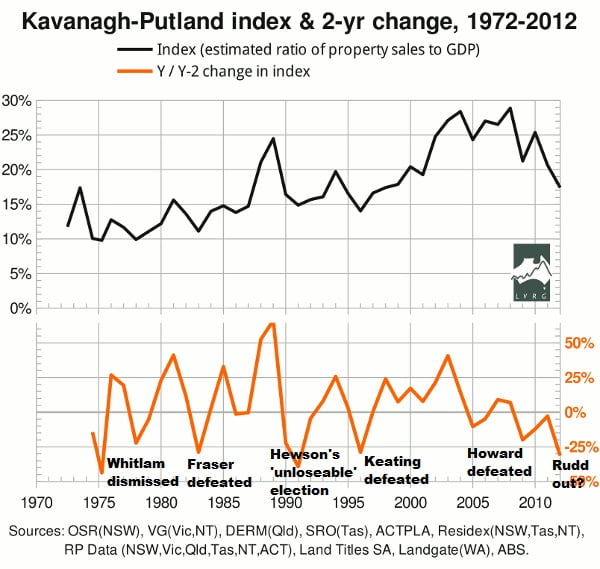Except for some sort of miracle, Australia is going to have a Liberal Party government from September 8th.
The budgetary shortfall of $30 billion in the Liberals’ promises won’t count against them.
Tony Abbott’s stupidly costly paid parental leave proposal won’t matter.
These things only matter to ‘welded on’ Labor supporters.
However, nether was it Kevin Rudd’s pink batts, nor his mining tax, nor Julia Gillard’s carbon tax, nor the minority government, nor Labor’s economic competence that sealed its doom.
Those issues matter only to ‘welded on’ Liberal supporters.
Journalists might run through a litany of possible contributors to the swing against the government and to the opposition, but they will always miss out on the one critical element.
It is what usually–if not always–removes the government of the day:-
It is only the swinging voters who will ensure there’s a change of government. More particularly, swinging voters (a) who have taken out a mortgage in the last few years, or (b) who are currently unable to afford a home.
(a) because this group is finding it increasingly difficult to service their bubble-inflated mortgages, and believe the Labor government is totally responsible for this, and
(b) because the frustrations of this group have also spilled over onto the incumbent government.
Oppositions do not win elections, governments lose them. However, the primary cause–how the “hip pocket nerve” is faring–seems always to become lost and invisible to journalists and punters, even to the swinging voters themselves. This is because we tend subconsciously to project any personal budgetary shortfall onto some aspect of the government other than the subliminal concern of the swinging voter: housing affordability.
Here’s the evidence since 1972:-

With mortgage rates increasing across the developed world due to rising bond yields, it’s only a matter of time until the same thing happens over here.
My guess it will be sooner rather than later and no doubt right on Tony’s watch.
Yes, I’m sure the same correlation exists at State level, Magnus, but haven’t done a full analysis. Certainly, the early 1990’s crash got two for the price of one (SA and Vic) over 333 Collins Street, the one building that came to personify the crash in those States. https://thedepression.org.au/?p=3497
Interesting correlation and probably a valid analysis re: the mortgage hip pocket effect.
It would be interesting to see the state KPI figures run against the incumbents getting kicked out, to see whether this effect still holds in Victoria and elsewhere.
I suspect strongly it would, making your KPI an actual economic AND political indicator that is probably a helluva lot better than Nielsen polls etc at both federal and state level. You could even run statistical correlations between the data-sets for a laugh to see how strongly it holds.
Perhaps this is a question worth a follow up article on the housing bubble dilemma? It would be very informative.